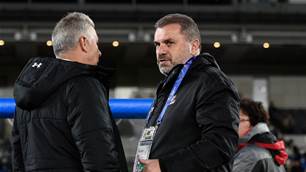Former Football Federation Australia technical director Rob Sherman admits the role was so compromised by competing factions he could do nothing during his 10 months in the job.
Sherman shocked the football community by quitting in frustration less than a year after leaving Melbourne Victory to take up the powerful position.
But he admitted to the FTBL Year Zero podcast: "I would actually say I've done nothing since I've been in the building.
"It was very frustrating actually getting things off the ground with some traction. I'm a doer – and in essence I found that inability to really progress things just massively frustrating."
Sherman says while the FFA was keen to back him and his plans, his vision was blocked by other forces within the football community including the member federations.
But the upheaval within the FFA over the change in management and structure meant Sherman's ambitious programme of change was left to gather dust.
"I was convinced that there'd be an opportunity to drive things," Sherman told the podcast. "So I was particularly keen to drive things in the international department and the elite pathway for academies.
"In essence, through a number of circumstances, obviously David Gallop departing and the hiatus that was left around that, the unbundling of the league, put priorities and then uncertainty in place."
Complicating matters was the decision to split the immediate future of Australian football into three separate working groups within the FFA.
"[There are] some very excellent people in roles and yet quite often the outcome of what the recommendations are, isn't as recommended," said the former player and coach, now back living in New Zealand.
"People further up the chain decide that x is better than y, [but] based on what? What experience do they actually have have at the coalface?"
HEAR MORE ON THIS AND MUCH MORE IN THE FULL PODCAST

LISTEN TO THE FTBL PODCAST HERE NOW:
[CLICK HERE TO PLAY IF YOU ARE ON CHROME]
SUBSCRIBE ON ITUNES HERE
He added: "That became evident when you were talking around the competition structures.
"You have three groups working – NPL review, new Second Division group, and you have the new leagues Working Group, which is working through the unbundling.
"But ultimately, the competition structure is one structure. It needs one conversation, of which there's probably three streams, but there's one conversation.
"Actually getting the information and insights and updates from each and having input into each was extremely difficult. And that's only one facet.
"If you talk about grassroots, it's the same.'
He added: "There aren't football departments.
"They have a thing called the technical department, which is predominantly pathways and coach aid, you have national teams in the context of the FFA, and you have community – and they don't actually talk much.
"We were definitely improving that, and there was a willingness to do that. But it's still not as it should be. It became overwhelming in the sense of how little progress you seem to be making.
"And ultimately, you know, I'm not 30, I'm down the other end of the scale – and my patience is not what it was..."
The one project Sherman got underway was a rewrite of academy criteria for clubs across the country - but that had stalled since December with no feedback in the months that followed.
"You can't just implement these things overnight," he said. "There's a process you have to go through, you have to prepare people. The likelihood of that getting rolled out this year would become more difficult.
"Looking at the international sphere and the finances of the FFA, and doing what we wanted to do, was looking more and more difficult.
"I could just see barrier after barrier."
By the time the Covid crisis hit, Sherman had already resigned – but the opportunities created for a massive reset of Australian football during the lockdown only frustrated him further.
While working out his notice, he saw a chance to use the shutdown to reinvent the way the sport was run.
HEAR MORE ON THIS AND MUCH MORE IN THE FULL PODCAST

LISTEN TO THE FTBL PODCAST HERE NOW:
[CLICK HERE TO PLAY IF YOU ARE ON CHROME]
SUBSCRIBE ON ITUNES HERE
"There was a window of opportunity because of the lack of activity," he said.
"Generally what happens – because the football side of the game is under resourced – the technical people are so busy that they don't have time to build resources, redefine and refine programs, because they're so busy just delivering what they've got to do.
"It was a perfect opportunity to co-ordinate a whole raft of things and get input from a whole raft of people across the game in this hiatus and actually get yourself lined up so that when restart happens all the ducks are in in place.
"And that hasn't happened."
Sherman sees potential in the Japanese model which puts the football first and commercial input is simply there to support the rest of the sport.
In Australia, he believes it has been the other way around for too long - and there's no vision to change it.
"Japan's often used as a model," he said. "If you look at their model as a diagram, they've got this rather large oval called football and supporting that is operations and business.
"And so the way the game looks – structured, delivered, coached and programs in schools – is all in place. Business and operations are the support mechanism to bring that to life.
"And I'm a firm believer that that's the way that is the most beneficial long term."
Australia, however, works in reverse, says Sherman. He added: "I just think that there's a mindset that they're in which is around the business model.
"Operations being primary, and the football almost secondary.
"Just shifting that [was difficult] in terms of [being] the lone voice because actually there aren't that many from the technical side represented in those conversations..."
YEAR ZERO is a series of FTBL podcasts talking to some of the movers and shakers in Australian football about what lies ahead for the sport in the wake of the coronavirus and the possible exit of Fox Sports. Click here to subscribe on iTunes.
Related Articles

Ange's year at Celtic FC: Podcast














